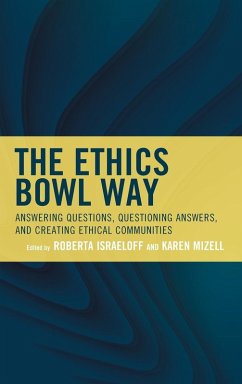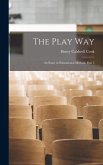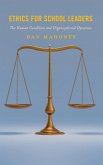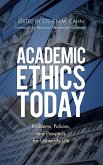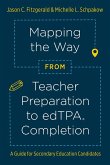The Ethics Bowl Way
Answering Questions, Questioning Answers, and Creating Ethical Communities
Herausgeber: Israeloff, Roberta; Mizell, Karen
The Ethics Bowl Way
Answering Questions, Questioning Answers, and Creating Ethical Communities
Herausgeber: Israeloff, Roberta; Mizell, Karen
- Gebundenes Buch
- Merkliste
- Auf die Merkliste
- Bewerten Bewerten
- Teilen
- Produkt teilen
- Produkterinnerung
- Produkterinnerung
Ethics Bowl espouses a new way to engage in discussions about complex ethical issues.
Andere Kunden interessierten sich auch für
![The Ethics of Digital Literacy The Ethics of Digital Literacy]() The Ethics of Digital Literacy81,99 €
The Ethics of Digital Literacy81,99 €![The Way to the Heart of the Pupil The Way to the Heart of the Pupil]() Hermann WeimerThe Way to the Heart of the Pupil35,99 €
Hermann WeimerThe Way to the Heart of the Pupil35,99 €![The Play Way The Play Way]() Henry Caldwell CookThe Play Way42,99 €
Henry Caldwell CookThe Play Way42,99 €![Ethics for School Leaders Ethics for School Leaders]() Dan MahoneyEthics for School Leaders105,99 €
Dan MahoneyEthics for School Leaders105,99 €![Academic Ethics Today Academic Ethics Today]() Academic Ethics Today141,99 €
Academic Ethics Today141,99 €![Way Up North Where the Kittiwakes Play Way Up North Where the Kittiwakes Play]() Juli-Ann GasperWay Up North Where the Kittiwakes Play27,99 €
Juli-Ann GasperWay Up North Where the Kittiwakes Play27,99 €![Mapping the Way from Teacher Preparation to Edtpa(r) Completion Mapping the Way from Teacher Preparation to Edtpa(r) Completion]() Jason C FitzgeraldMapping the Way from Teacher Preparation to Edtpa(r) Completion61,99 €
Jason C FitzgeraldMapping the Way from Teacher Preparation to Edtpa(r) Completion61,99 €-
-
-
Ethics Bowl espouses a new way to engage in discussions about complex ethical issues.
Hinweis: Dieser Artikel kann nur an eine deutsche Lieferadresse ausgeliefert werden.
Hinweis: Dieser Artikel kann nur an eine deutsche Lieferadresse ausgeliefert werden.
Produktdetails
- Produktdetails
- Verlag: Rowman & Littlefield Publishers
- Seitenzahl: 160
- Erscheinungstermin: 6. Mai 2022
- Englisch
- Abmessung: 235mm x 157mm x 13mm
- Gewicht: 392g
- ISBN-13: 9781475861617
- ISBN-10: 1475861613
- Artikelnr.: 63431133
- Herstellerkennzeichnung
- Libri GmbH
- Europaallee 1
- 36244 Bad Hersfeld
- gpsr@libri.de
- Verlag: Rowman & Littlefield Publishers
- Seitenzahl: 160
- Erscheinungstermin: 6. Mai 2022
- Englisch
- Abmessung: 235mm x 157mm x 13mm
- Gewicht: 392g
- ISBN-13: 9781475861617
- ISBN-10: 1475861613
- Artikelnr.: 63431133
- Herstellerkennzeichnung
- Libri GmbH
- Europaallee 1
- 36244 Bad Hersfeld
- gpsr@libri.de
Roberta Israeloff has directed the Squire Family Foundation, devoted to advancing philosophy education, since its inception in 2007. The Foundation co-founded several national organizations, including Philosophy Learning and Teacher Organization (PLATO), and the National High School Ethics Bowl. Karen Mizell is Professor of Philosophy at Utah Valley University and Director of the Minor in Ethics and the Ethics Certificate program. She is founder and past director of the Utah High School Ethics Bowl, co-founder of the Wasatch Intercollegiate Ethics Bowl, and the recipient of several teaching and service awards, including the State of Utah Award for Excellence in Service-Learning.
Foreword
Preface
Acknowledgements
Part I: Ethics Bowl Basics
Chapter 1: The Ideal of an Ethical Community-Robert F. Ladenson
Chapter 2: Debating Democracy: Building Argument Programs for Good
Citizenship-Kyle Robertson
Chapter 3: Optional but Not Required: The Role of Ethical Theory and
Research in Ethics Bowl Preparation-Richard Greene
Part II: Best Practices
Chapter 4: Values in Ethics Bowl Design-Jeanine DeLay
Chapter 5: The Enduring Rewards of Ethics Bowl Case Writing-Peggy Connolly
Chapter 6: Coaching: Winning Isn't Everything-Marcia A. McKelligan
Chapter 7: Listening Well: Judging an Ethics Bowl-Wendy C. Turgeon
Chapter 8: Beyond Argument: Learning Life Skills through Ethics Bowl-Andrew
Cullison
Chapter 9: Room for All: Inclusivity and the High School Ethics Bowl-Jana
Mohr Lone
Part III: Expanding the Reach of Ethics Bowl
Chapter 10: The "Turn to Reason": Ethics Bowl in the Classroom-Will Beals,
Christina Drogalis, Morgan Wallhagen
Chapter 11: Deliberating Across the Lifespan-Michael Vazquez
Chapter 12: Ethics Bowl at San Quentin-Connie Krosney and Kathy Richards
Chapter 13: Meeting the Challenge: The Future of Ethics Bowl-Alex M.
Richardson
Chapter 14: From Ethics Bowler to Coach: Lifelong Learning through Ethics
Bowl-Rachel Robison-Greene
Notes
References for Selected Chapters
Appendix
* Resources
* Sample High School Ethics Bowl Case and Study Questions
Contributors
Preface
Acknowledgements
Part I: Ethics Bowl Basics
Chapter 1: The Ideal of an Ethical Community-Robert F. Ladenson
Chapter 2: Debating Democracy: Building Argument Programs for Good
Citizenship-Kyle Robertson
Chapter 3: Optional but Not Required: The Role of Ethical Theory and
Research in Ethics Bowl Preparation-Richard Greene
Part II: Best Practices
Chapter 4: Values in Ethics Bowl Design-Jeanine DeLay
Chapter 5: The Enduring Rewards of Ethics Bowl Case Writing-Peggy Connolly
Chapter 6: Coaching: Winning Isn't Everything-Marcia A. McKelligan
Chapter 7: Listening Well: Judging an Ethics Bowl-Wendy C. Turgeon
Chapter 8: Beyond Argument: Learning Life Skills through Ethics Bowl-Andrew
Cullison
Chapter 9: Room for All: Inclusivity and the High School Ethics Bowl-Jana
Mohr Lone
Part III: Expanding the Reach of Ethics Bowl
Chapter 10: The "Turn to Reason": Ethics Bowl in the Classroom-Will Beals,
Christina Drogalis, Morgan Wallhagen
Chapter 11: Deliberating Across the Lifespan-Michael Vazquez
Chapter 12: Ethics Bowl at San Quentin-Connie Krosney and Kathy Richards
Chapter 13: Meeting the Challenge: The Future of Ethics Bowl-Alex M.
Richardson
Chapter 14: From Ethics Bowler to Coach: Lifelong Learning through Ethics
Bowl-Rachel Robison-Greene
Notes
References for Selected Chapters
Appendix
* Resources
* Sample High School Ethics Bowl Case and Study Questions
Contributors
Foreword
Preface
Acknowledgements
Part I: Ethics Bowl Basics
Chapter 1: The Ideal of an Ethical Community-Robert F. Ladenson
Chapter 2: Debating Democracy: Building Argument Programs for Good
Citizenship-Kyle Robertson
Chapter 3: Optional but Not Required: The Role of Ethical Theory and
Research in Ethics Bowl Preparation-Richard Greene
Part II: Best Practices
Chapter 4: Values in Ethics Bowl Design-Jeanine DeLay
Chapter 5: The Enduring Rewards of Ethics Bowl Case Writing-Peggy Connolly
Chapter 6: Coaching: Winning Isn't Everything-Marcia A. McKelligan
Chapter 7: Listening Well: Judging an Ethics Bowl-Wendy C. Turgeon
Chapter 8: Beyond Argument: Learning Life Skills through Ethics Bowl-Andrew
Cullison
Chapter 9: Room for All: Inclusivity and the High School Ethics Bowl-Jana
Mohr Lone
Part III: Expanding the Reach of Ethics Bowl
Chapter 10: The "Turn to Reason": Ethics Bowl in the Classroom-Will Beals,
Christina Drogalis, Morgan Wallhagen
Chapter 11: Deliberating Across the Lifespan-Michael Vazquez
Chapter 12: Ethics Bowl at San Quentin-Connie Krosney and Kathy Richards
Chapter 13: Meeting the Challenge: The Future of Ethics Bowl-Alex M.
Richardson
Chapter 14: From Ethics Bowler to Coach: Lifelong Learning through Ethics
Bowl-Rachel Robison-Greene
Notes
References for Selected Chapters
Appendix
* Resources
* Sample High School Ethics Bowl Case and Study Questions
Contributors
Preface
Acknowledgements
Part I: Ethics Bowl Basics
Chapter 1: The Ideal of an Ethical Community-Robert F. Ladenson
Chapter 2: Debating Democracy: Building Argument Programs for Good
Citizenship-Kyle Robertson
Chapter 3: Optional but Not Required: The Role of Ethical Theory and
Research in Ethics Bowl Preparation-Richard Greene
Part II: Best Practices
Chapter 4: Values in Ethics Bowl Design-Jeanine DeLay
Chapter 5: The Enduring Rewards of Ethics Bowl Case Writing-Peggy Connolly
Chapter 6: Coaching: Winning Isn't Everything-Marcia A. McKelligan
Chapter 7: Listening Well: Judging an Ethics Bowl-Wendy C. Turgeon
Chapter 8: Beyond Argument: Learning Life Skills through Ethics Bowl-Andrew
Cullison
Chapter 9: Room for All: Inclusivity and the High School Ethics Bowl-Jana
Mohr Lone
Part III: Expanding the Reach of Ethics Bowl
Chapter 10: The "Turn to Reason": Ethics Bowl in the Classroom-Will Beals,
Christina Drogalis, Morgan Wallhagen
Chapter 11: Deliberating Across the Lifespan-Michael Vazquez
Chapter 12: Ethics Bowl at San Quentin-Connie Krosney and Kathy Richards
Chapter 13: Meeting the Challenge: The Future of Ethics Bowl-Alex M.
Richardson
Chapter 14: From Ethics Bowler to Coach: Lifelong Learning through Ethics
Bowl-Rachel Robison-Greene
Notes
References for Selected Chapters
Appendix
* Resources
* Sample High School Ethics Bowl Case and Study Questions
Contributors

